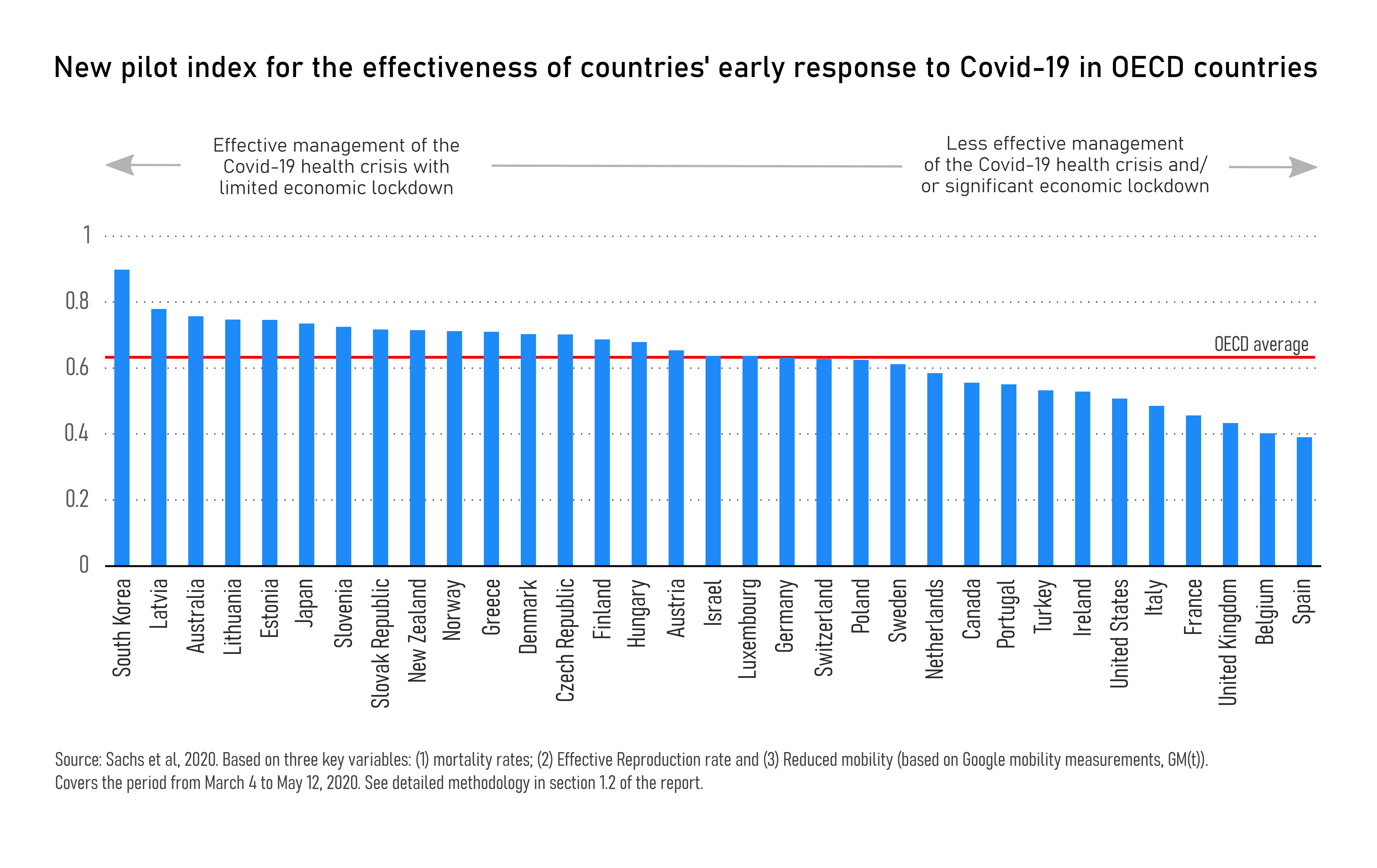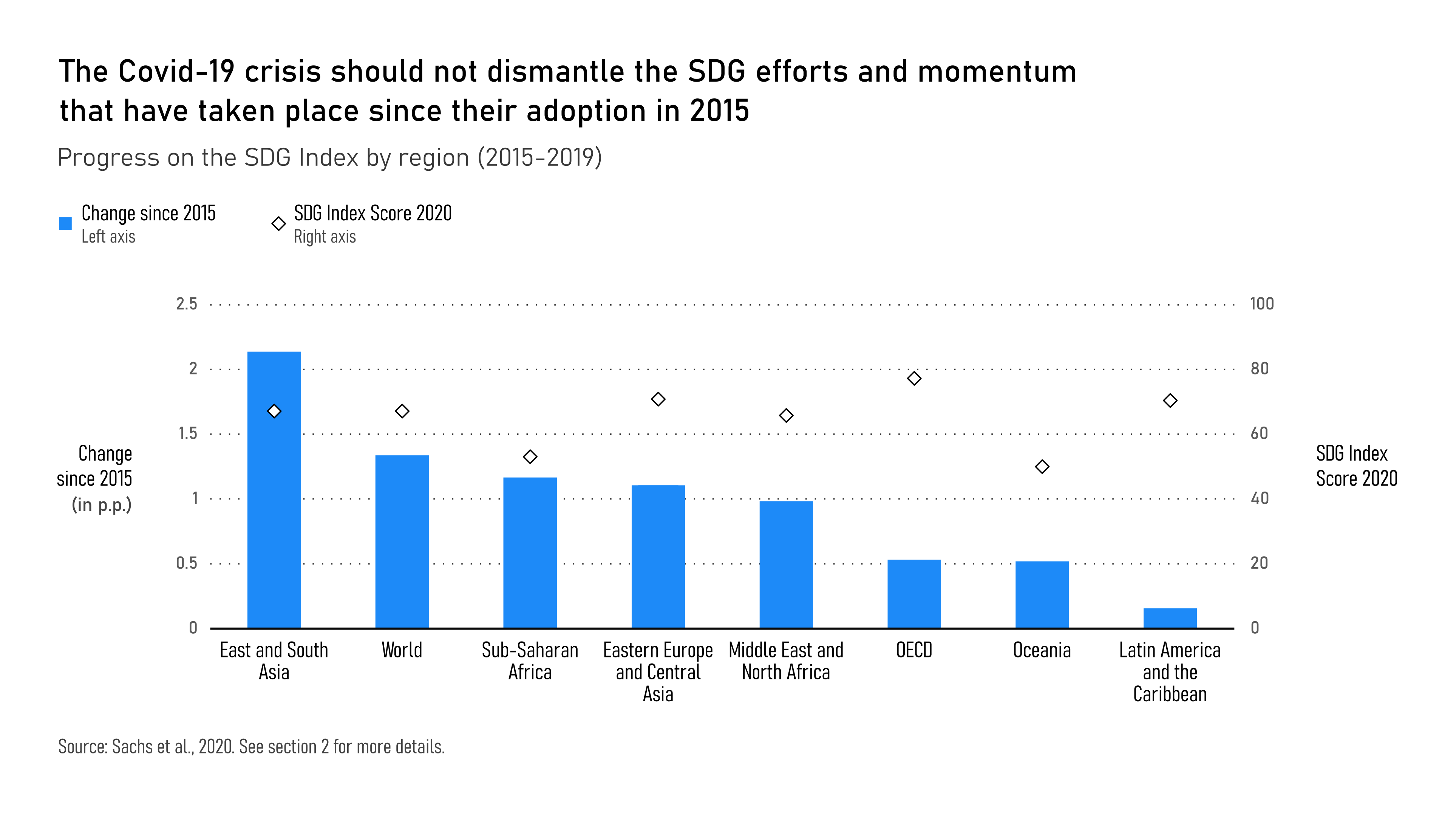Jun 30, 2020Press Release: Sustainable Development Report 2020
Available in: English | Arabic | Chinese | French | German | Italian | Portuguese | Russian
New Report shows how to use the Sustainable Development Goals to build back better after Covid-19
New York, 30 June 2020 - Today, the Sustainable Development Report (SDR) 2020, including the SDG Index and Dashboards, was released. It was written by lead author Jeffrey Sachs and a team of independent experts working at the Sustainable Development Solutions Network (SDSN) and Bertelsmann Stiftung, and published by Cambridge University Press.
"The Sustainable Development Goals are needed more than ever. Their bedrock principles of social inclusion, universal access to public services, and global cooperation are the guideposts for fighting Covid-19 as well as for the investment-led recovery the world should adopt to overcome the economic crisis caused by the pandemic. This year’s report focuses on the short-term fight to stop Covid-19 – emphasizing the importance of public health strategies -- and on the long-term transformations to guide the recovery phase. As the report shows, there was clear SDG progress before this year’s pandemic. With sound policies and strong global cooperation, we can restore that progress in the coming decade", says Jeffrey D. Sachs, Director of the SDSN and first author of the report.
The report outlines the likely short-term impacts of Covid-19 on the Sustainable Development Goals (SDGs) and describes how the SDGs can frame the recovery. The report also tracks progress by countries towards the SDGs. Since its launch in 2016, this annual report has provided the most up-to-date data to track and rank the performance of all UN member states on the SDGs. As an unofficial monitoring tool, the SDR is complementary to official efforts to monitor the SDGs.
Full report:
Sachs, J., Schmidt-Traub, G., Kroll, C., Lafortune, G., Fuller, G., Woelm, F. (2020): The Sustainable Development Goals and COVID-19. Sustainable Development Report 2020. Cambridge University Press.The report can be downloaded for free here:
Website: https://www.sdgindex.org/
Data visualization: https://dashboards.sdgindex.org/
Learning the lessons: Among OECD countries, South Korea was best able to address the health impacts of Covid-19 while mitigating impacts on the economy
The report analyses how governments have responded to the immediate health crisis and describes emerging lessons for public health authorities, governments at large, and the public. The crisis has shown profound weaknesses in public health systems, including in many of the richest countries that were deemed to be well prepared for such a pandemic. Meanwhile, some countries, particularly in the Asia-Pacific region, have (so far) been successful in containing Covid-19 and minimizing the damage to their economies. The report presents a novel approach and pilot Index for the effectiveness of countries early response to Covid-19 in 33 OECD countries which integrates health and economic considerations.
Overall, South Korea tops this new Index followed by Baltic countries and countries from the Asia Pacific region. By contrast, Western European countries and the United States were less successful in mitigating health and economic impacts from Covid-19.

Strict and prolonged lockdowns, although costly, was most probably the right policy response for countries lacking protective personal equipment (e.g. masks) and with lower testing and hospital intensive care capacities. Strict and prolonged lockdowns contributed to saving many thousands of lives (Flaxman et al, 2020).
Six SDG Transformations to support a sustainable and fair recovery
The report finds that between 2015 and 2019, the global community made significant progress on the SDGs. Progress varies across SDGs, regions, and countries. As in previous years, the SDG Index is topped by three Nordic countries – Sweden, Denmark and Finland. Yet, even these countries face significant challenges in achieving at least one of the goals. No country is on track for achieving all SDGs.
Covid-19 is likely to have severe short-term negative impacts on most SDGs. In particular on SDG 1 (No Poverty), SDG 2 (No Hunger), SDG 3 (Good Health and Well-Being) and SDG 8 (Decent Work and Economic Growth). Covid-19 gravely amplifies income inequalities and other forms of inequalities. The bright spots in a foreboding picture are the reduced environmental impacts as a result of the decline in economic activity. A key objective is to restore economic activity without simply restoring the old patterns of environmental degradation.
The SDGs and the Six SDG Transformations should guide the recovery from Covid-19 and help build back better. No country will be safe from the pandemic unless all countries bring the virus under control. The report presents a detailed framework for how countries can build back better using the SDGs.

The urgent need for more (not less!) global partnerships and collaboration (SDG 17)
The current crisis, including hostilities among major powers, raises the specter of global conflict instead of global cooperation. The good news is that most of the world urgently wants multilateralism and cooperation. The bad news is that some countries do not, while others are paralyzed by their own crises, budget deficits, and divisions of local politics. The multilateral situation is therefore fraught and needs bolstering.
International cooperation, covered under SDG 17 (Partnerships for the Goals), can speed a favorable and rapid resolution to the epidemic. Indeed, there is no other way to succeed.
The report identifies five key measures that global cooperation should include:
- Disseminate best practices rapidly.
- Strengthen financing mechanisms for developing countries.
- Address hunger hotspots.
- Ensure social protection.
- Promote new drugs and vaccines.
Other findings of the Sustainable Development Report 2020
- Since their adoption in 2015, East and South Asia is the region that progressed most on the SDGs. At the country level, Côte d’Ivoire, Burkina Faso and Cambodia progressed most. By contrast, Venezuela, Zimbabwe and the Democratic Republic of Congo regressed most due to conflicts and other economic and social reasons.
- High-income countries generate significant transboundary impacts embodied into trade and consumption that undermine other countries abilities to achieve the SDGs. For the first time, trends over time are also presented. Deforestation and biodiversity threats caused by unsustainable supply chains increase the likelihood of future epidemics.
- Despite political rhetoric, few countries have meaningfully integrated the SDGs into public management practices and procedures including national budgets. In particular, considering their size and importance in the global economy and trade, G20 countries should intensify policy efforts and actions for the SDGs.
Contacts
Dr. Guido Schmidt-Traub | guido.schmidt-traub@unsdsn.org
Executive Director
Sustainable Development Solutions Network (SDSN)
Dr. Christian Kroll | c.kroll@alumni.lse.ac.uk | +491736601646
Senior Expert for Sustainable Development
Bertelsmann Stiftung
Guillaume Lafortune | guillaume.lafortune@unsdsn.org | +33 6 60 27 57 50
Project Manager
Sustainable Development Solutions Network (SDSN)
About SDSN
The UN Sustainable Development Solutions Network (SDSN) mobilizes scientific and technical expertise from academia, civil society, and the private sector to support practical problem solving for sustainable development at local, national, and global scales. The SDSN has been operating since 2012 under the auspices of the UN Secretary-General. The SDSN is building national and regional networks of knowledge institutions, solution-focused thematic networks, and the SDG Academy, an online university for sustainable development.
About Bertelsmann Stiftung
The Bertelsmann Stiftung is one of the largest foundations in Germany. It works to promote social inclusion and is committed to advancing this goal through programs that improve education, shape democracy, advance society, promote health, vitalize culture and strengthen economies. The Bertelsmann Stiftung is a non-partisan, private operating foundation.
About Cambridge University Press
Cambridge University Press dates from 1534 and is part of the University of Cambridge. Its mission is to unlock people's potential with the best learning and research solutions. Its vision is a world of learning and research inspired by Cambridge. Playing a leading role in today's global market place, Cambridge University Press has over 50 offices around the globe, and distributes products to nearly every country in the world.